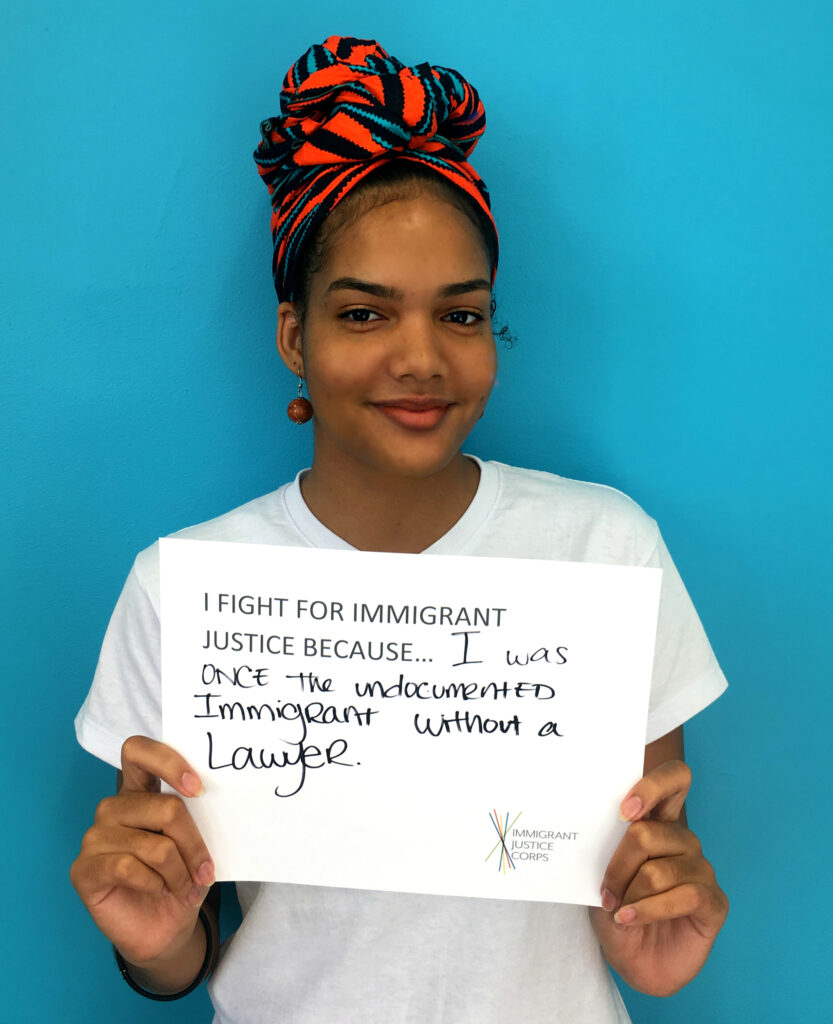Where are they now?: Jill Martin Diaz
Jill Martin Diaz, a 2016 Justice Fellow with Sanctuary for Families, is executive director of the Vermont Asylum Assistance Project, Inc. (VAAP). Jill was named the organization’s first executive director in January. In September, VAAP will host its first IJC Justice Fellows, Emma Matters-Wood and Cameron Briggs Ramos.
After the IJC fellowship, Jill completed a two-year fellowship with Vermont Legal Aid, before joining Vermont Law School as a professor, becoming associate director of the school’s Center for Justice Reform in 2023.
What brought you to IJC?
When I learned about IJC, which was pretty early on in my law school journey, I set my heart on it, much to the frustration of my clinical professor and career counselors and everyone around me. There were just 20 spots, and I wasn’t someone going to a superstar law school. But I just had my heart set on it. Every choice I made in law school – every internship, every class, every summer – was made to prepare the best possible resume for IJC. I put all my eggs in that basket, and fortunately for me, it worked out.
There was nothing like it, there’s still nothing like it. The fellowship is an opportunity to provide high-volume direct legal services to noncitizens in need and to do it in a supportive, mentorship-focused environment. Not only are you matched with amazing mentors, like my IJC host, who I’m still very close with, but you also have the support of IJC and the IJC community, who are colleagues and connections I carry forward today.
What inspired you to work in the immigration field?
Like many folks, my family has lived immigration experience. We’re Cuban American. My family’s immigration history is one that’s shaped by relative privilege, but even with relative privilege, the stories that were passed down to me, that I grew up with, were stories of discrimination and language barriers and all kinds of other challenges.
So I had that perspective, coming up in south Florida, and then I went on to have a lot of immigration experiences of my own. I’ve had permanent residency in a few other countries, and I’ve helped family members to immigrate to the United States. I also did some international development work between college and law school. Once I was back in the states, in law school, thinking about where my passion and skill set could be useful to the community around me, I felt like immigration advocacy, access to immigration legal services was it.
I thought I was going to be a policy person, but I didn’t like my summer in the ivory tower. And once I started doing my immigration clinic and working directly with folks, I was hooked.
What is some advice for lawyers working in the immigration field?
I followed my IJC fellowship with a general poverty law fellowship here in Vermont. It was a way to kind of transition into the Vermont Bar, and it was a pause from immigration practice for two years. Being a generalist poverty lawyer and then returning to immigration confirmed that immigration lawyering is poverty lawyering.
We need to really think about what are the actual goals that our clients are coming to us for. What is it that they want us to use legal tools to help them achieve? We really need to hear that and be responsive to it as the federal immigration system becomes more and more intractable, more and more broken and dysfunctional and harmful. It’s something you need to remind yourself of, especially if you’re doing a defensive asylum case that will languish in the system for years. You need to stop and think – what is this person actually saying they need right now? They need family connection. They need money to pay rent. They need a job. And what are the other ways that I can help? What advice can I give them? What tools can I give them? Who can I introduce them to, to help make those goals happen? The immigration goal is the long term solution. But there’s much needed emergency short term solutions.
The second thing I think about is connections – our relationships are everything. We can’t do this alone, and we do this together. Now I’m in this very humbling position of being selected to host Vermont’s first IJC fellow, and I’m thinking about the relationships that I’ve carried with me for 10 years from my fellowship. My immigration team that I practiced with as a Fellow, we’re all still friends, and we have our own little Google group where we ask each other questions. One of my former clinic students is now going to clerk at the same court where Judge Carmen Maria Rey Caldas (former Legal Director of Sanctuary for Families’ immigration unit) sits in Georgia. I was able to connect them for an informational interview when my student was a candidate. These relationships are real. I don’t think about it in terms of networking in a nefarious way or a getting-ahead way. The Immigration Bar and the advocacy community and the organizations that lead the movements are made up of amazing people. Open yourself up to connecting with these folks. It’s just such a beautiful community to be a part of as we fight for something that shouldn’t be this hard to fight for, but it is.
